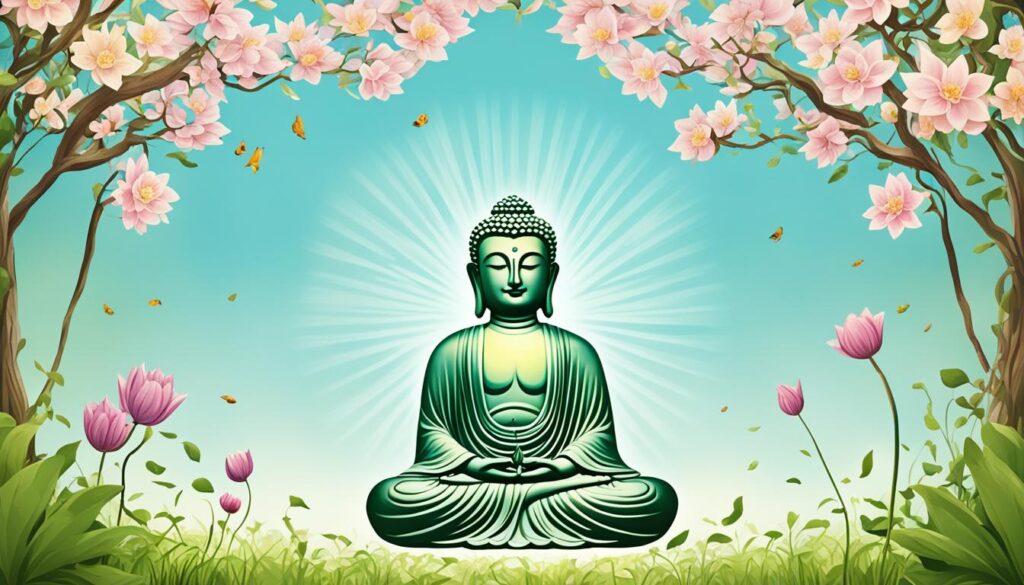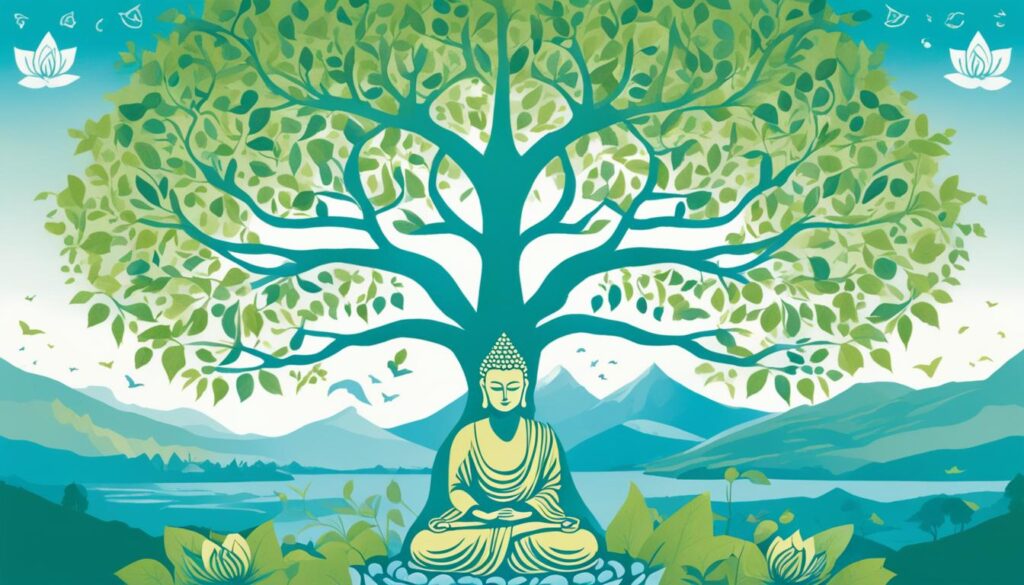Have you ever wondered how you can find peace amidst the chaos of everyday life? How can you navigate moral challenges and make ethical decisions with clarity and compassion? Discover the transformative power of Buddhist ethics and unlock a path to inner tranquility and moral understanding.
In a world filled with conflicts and uncertainties, Buddhist ethics offer a timeless wisdom that can guide us towards a more peaceful and virtuous existence. Rooted in the teachings of the Buddha, Buddhist ethics provide a moral compass to navigate life’s complexities, promoting kindness, mindfulness, and compassionate action.
Key Takeaways:
- Buddhist ethics offer valuable insights and teachings for cultivating inner peace and harmony.
- Moral principles in Buddhism emphasize nonviolence, compassion, and the elimination of desires.
- By following ethical guidelines and practicing mindfulness, individuals can develop a strong moral compass.
- Buddhist teachings on ethics provide practical tools for leading a mindful and ethical existence.
- Embracing Buddhist ethics can lead to personal and societal transformation.
The Teachings of Buddha
The teachings of Buddha hold profound wisdom that can guide you on your journey towards understanding and liberation. Central to Buddhist philosophy are the Four Noble Truths and the Eightfold Path. Through these teachings, you can gain insight into the nature of suffering and the path to freedom and enlightenment.
The Four Noble Truths reveal the fundamental truths of existence. They teach us that life is marked by suffering, which arises from our cravings and attachments. However, suffering can be eliminated, and this is possible by following the Eightfold Path.
| Four Noble Truths | Eightfold Path |
|---|---|
| 1. Life is characterized by suffering (Dukkha). | 1. Right View: Understanding the truth of existence. |
| 2. Suffering arises from craving (Tanha). | 2. Right Intention: Cultivating wholesome intentions. |
| 3. Suffering can be eliminated (Nirodha). | 3. Right Speech: Speaking truthfully and compassionately. |
| 4. The Eightfold Path is the way to eliminate suffering (Magga). | 4. Right Action: Engaging in ethical conduct. |
The Eightfold Path presents a comprehensive framework for moral and mental development. It consists of three aspects: wisdom, ethical conduct, and mental cultivation. By cultivating wisdom, we develop understanding and insight. Ethical conduct guides our actions, speech, and livelihood. Mental cultivation involves training the mind through meditation practices such as mindfulness of breathing and insight meditation.
Meditation plays a vital role in Buddhist practice, allowing us to calm the mind, cultivate insight, and develop a profound understanding of the impermanence and selflessness of all phenomena. Through practices like insight meditation and tranquility meditation, we can deepen our concentration, expand our awareness, and experience the transformative power of mindfulness and insight.

By embracing the teachings of Buddha, you embark on a path of self-discovery, compassion, and spiritual growth. These teachings provide profound guidance and practical methods to navigate the challenges of life, freeing yourself from suffering and attaining inner peace and enlightenment.
Mindfulness and Compassion in Buddhist Ethics
Mindfulness and compassion are foundational principles in Buddhist ethics. The practice of mindfulness involves being fully present in the moment, free from judgment and attachment. It is cultivated through various meditation techniques, such as mindfulness meditation and vipassana meditation. By developing mindfulness, you can gain insight into the true nature of reality, fostering self-awareness and a deep sense of tranquility.
Compassion, on the other hand, is the recognition of the suffering of others and the genuine desire to alleviate it. In Buddhism, compassion is seen as an essential virtue that fosters empathy, kindness, and altruism. Through compassion meditation and loving-kindness meditation, you can develop a genuine sense of care and concern for all sentient beings, including yourself. This practice allows you to cultivate deep connections with others and contribute to the well-being of the world around you.

The Benefits of Mindfulness and Compassion
The cultivation of mindfulness and compassion in Buddhist ethics brings forth numerous benefits to individuals and society as a whole. Here are some key advantages of practicing mindfulness and compassion:
- Emotional well-being: Mindfulness and compassion help to reduce stress, anxiety, and negative emotions. They promote a greater sense of peace, happiness, and contentment in life.
- Improved relationships: By being fully present and deeply empathetic, mindfulness and compassion enhance interpersonal relationships, fostering understanding, love, and respect.
- Enhanced self-awareness: Mindfulness allows you to observe your thoughts, emotions, and sensations with a non-judgmental awareness. This self-awareness leads to personal growth and the ability to make conscious choices.
- Increased resilience: Mindfulness and compassion provide tools for navigating life’s challenges by cultivating inner strength, adaptability, and the ability to respond skillfully to difficult situations.
- Positive societal impact: The practice of mindfulness and compassion extends beyond the individual. It inspires acts of kindness, social responsibility, and the promotion of justice and equality.
| Mindfulness in Buddhism | Compassion in Buddhism |
|---|---|
| Mindfulness involves being fully present in the moment, without judgment or attachment. It is cultivated through meditation practices such as mindfulness meditation and vipassana meditation. | Compassion is the recognition of suffering and the sincere desire to alleviate it. It is cultivated through meditation practices such as compassion meditation and loving-kindness meditation. |
| Mindfulness promotes self-awareness, a deep sense of tranquility, and insight into the impermanent nature of all things. | Compassion fosters empathy, kindness, and altruism, leading to deep connections with others and the cultivation of a caring and compassionate attitude. |
| Practicing mindfulness improves emotional well-being, enhances self-awareness, and cultivates resilience. | Practicing compassion improves relationships, promotes social harmony, and contributes to the well-being of oneself and others. |
Ethical Guidelines in Buddhism
In Buddhism, ethical guidelines play a crucial role in shaping one’s moral conduct and promoting a virtuous way of life. These guidelines help individuals navigate their actions and decisions with mindfulness and compassion, fostering harmony and inner growth. The two primary sets of ethical principles in Buddhism are the Five Precepts and the Eight Precepts.
The Five Precepts
The Five Precepts are fundamental moral guidelines followed by lay Buddhists. These precepts serve as a compass for leading an ethical life and establishing harmonious relationships:
- Refrain from killing: Respect the sanctity of life and avoid causing harm to any sentient being.
- Refrain from stealing: Respect the property of others and live with honesty and integrity.
- Refrain from sexual misconduct: Cultivate healthy and responsible relationships, maintaining fidelity and mutual consent.
- Refrain from false speech: Practice truthful communication, avoiding lies, deception, gossip, and harsh speech.
- Refrain from using intoxicants: Ensure a clear and mindful state of mind, free from the influence of substances that cloud judgment and lead to unwholesome actions.
The Eight Precepts
The Eight Precepts encompass more rigorous ethical guidelines and are often observed by monastics and individuals seeking a deeper commitment to spiritual practice. These precepts expand on the Five Precepts and include:
- Refraining from eating after noon: Cultivate restraint and moderation in one’s consumption, fostering discipline and mindfulness.
- Avoiding entertainment and adornments: Simplify one’s lifestyle, letting go of worldly distractions and attachments.
- Refraining from using luxurious beds: Embrace simplicity, developing contentment and gratitude for the present moment.
By adhering to these ethical guidelines, practitioners cultivate a moral foundation that encourages mindfulness, compassion, and awareness in every aspect of life. These principles promote self-reflection, empathy, and a deep sense of interconnectedness with all beings.

| Five Precepts | Eight Precepts |
|---|---|
| 1. Refrain from killing | 1. Refrain from killing |
| 2. Refrain from stealing | 2. Refrain from stealing |
| 3. Refrain from sexual misconduct | 3. Refrain from sexual misconduct |
| 4. Refrain from false speech | 4. Refrain from false speech |
| 5. Refrain from using intoxicants | 5. Refrain from using intoxicants |
| — | 6. Refrain from eating after noon |
| — | 7. Avoiding entertainment and adornments |
| — | 8. Refraining from using luxurious beds |
Tranquility and Insight in Buddhist Meditation
Buddhist meditation practices offer a profound journey towards cultivating tranquility and gaining deep insight into the nature of existence. Through the practice of tranquility meditation, also known as shamatha, you can develop a peaceful and focused mind by cultivating deep concentration. This practice allows you to calm the mind, free it from distractions, and experience a sense of tranquility that promotes inner peace and well-being.
Just like a still and serene lake reflects the beauty of its surroundings, tranquility meditation allows you to cultivate a mind that is clear and receptive. By focusing your attention on a single object, such as your breath or a visual image, you can gradually train your mind to become calm and unified. This state of deep concentration paves the way for profound mental states known as jhanas.
Jhanas are elevated levels of mental unification and concentration that can be reached through tranquility meditation. They are characterized by deep absorption and a profound sense of tranquility. In these states, the mind becomes fully unified and free from the distractions of everyday thoughts and concerns. The jhanas offer a profound experience of peace, joy, and present-moment awareness, allowing you to explore the depths of your own consciousness.
Insight meditation, also known as vipassana, complements tranquility meditation by focusing on the investigation of the true nature of phenomena. It involves cultivating a deep understanding of the impermanence, unsatisfactoriness, and selflessness of all things. Through the practice of insight meditation, you develop the ability to observe the arising and passing away of sensations, thoughts, and emotions with clarity and equanimity.
Insight meditation invites you to explore the depths of your own mind and gain direct personal insight into the nature of reality. By witnessing the impermanent and ever-changing nature of all phenomena, you develop a profound understanding that everything arises and passes away, ultimately leading to a deep sense of liberation and freedom.
Both tranquility and insight meditation are essential components of Buddhist practice. They work together to cultivate deep concentration, mindfulness, and wisdom. Through tranquility meditation, you develop the foundation of a calm and unified mind, while insight meditation allows you to investigate and gain direct experiential insights into the nature of reality. Together, these practices lead to a profound transformation of consciousness and a deepening of spiritual insight.
Effort, Letting Go, and Renunciation in Buddhist Practice
In the practice of Buddhism, effort is a fundamental aspect of spiritual growth and development. It requires dedication, perseverance, and a commitment to inner transformation. With skillful effort, one can attain profound insights and deepen their understanding of the nature of existence.
Letting go is another essential component of Buddhist practice. It involves releasing attachments, desires, and the burdens of the past and future. By relinquishing these mental and emotional burdens, one can cultivate a present-moment focus and experience a greater sense of peace and freedom. Letting go allows the mind to be unburdened and to reside in the here and now.
Renunciation is the act of voluntarily relinquishing worldly objects, desires, and attachments. It is a deliberate choice to detach oneself from material possessions, sensual pleasures, and worldly ambitions. Renunciation is not about denying oneself joy or comfort, but rather recognizing that true happiness and fulfillment are not dependent on external factors. By renouncing attachments, one can develop a profound sense of contentment and inner freedom.
Effort and Letting Go: Two Sides of the Same Coin
In Buddhist practice, effort and letting go go hand in hand. It takes effort to let go, and in letting go, one finds greater ease in their efforts. Effort is directed towards letting go of attachments and desires that bind us to suffering. By exerting effort to let go, we create space for growth, transformation, and a deeper connection with our innermost being.
Through the practice of meditation and mindfulness, we cultivate the ability to observe our thoughts, emotions, and sensations without getting caught up in them. This requires effort and discipline. As we develop this skill, we become more adept at recognizing attachments and letting go of clinging to them. This process of letting go allows for clearer perception and a more profound understanding of ourselves and the world around us.
The Benefits of Renunciation
Renunciation is often misunderstood as a practice of deprivation or asceticism. However, its true essence lies in freeing oneself from the endless pursuit of temporary pleasures and external validation. By renouncing attachments and desires, we redirect our energy towards cultivating inner virtues, such as compassion, wisdom, and unconditional love.

Rather than seeking happiness and fulfillment through external sources, renunciation teaches us to turn inward and discover the innate peace and contentment that resides within us. When we let go of the desire for worldly possessions and achievements, we can connect with a deeper sense of purpose and find sustainable joy in the present moment.
Renunciation does not require us to abandon our responsibilities or withdraw from society. It is a gentle invitation to simplify our lives, reduce our attachments to material possessions, and create space for spiritual growth and inner transformation. By embracing renunciation, we can experience a profound sense of liberation and cultivate a lasting sense of inner peace.
| Effort in Buddhism | Letting Go in Buddhism | Renunciation in Buddhism |
|---|---|---|
| Requires dedication, perseverance, and commitment to inner transformation. | Requires releasing attachments, desires, and burdens of the past and future. | Voluntarily relinquishing worldly objects, desires, and attachments. |
| Cultivates growth, insight, and understanding. | Fosters present-moment focus and a sense of peace and freedom. | Develops contentment, inner freedom, and connection with inner virtues. |
| Effort and letting go complement each other, leading to deeper transformation. | Renunciation redirects energy towards inner development and sustainable joy. | Renunciation simplifies life, fosters spiritual growth, and liberates the mind. |
Cultivating Silence and Present-Moment Awareness in Buddhist Meditation
Cultivating silence and present-moment awareness is a transformative aspect of Buddhist meditation. In our busy lives filled with constant noise and distractions, finding inner peace and clarity becomes essential. By embracing silent awareness and letting go of the incessant inner chatter, you can tap into the profound wisdom of the present moment.
In the practice of silent awareness, you consciously observe your thoughts without getting entangled in them. This requires thought control, where you gently redirect your attention back to the present whenever your mind wanders. By acknowledging and letting go of thoughts that arise, you create space for deep stillness and inner peace to flourish.
Imagine a tranquil lake, undisturbed by ripples or waves. This is the state of mind that silent awareness cultivates, where you can fully immerse yourself in the richness of each moment. It allows you to experience life directly, free from the burden of past regrets or future preoccupations. The practice of silent awareness gently guides you to let go of attachments to the past and future, anchoring you firmly in the present.
In the hustle and bustle of daily life, the quiet observer within you whispers the secrets of profound peace and clarity.
As you deepen your practice of silent awareness, you become more attuned to the subtle nuances of your experience. You develop a heightened sensitivity to the present moment, noticing the intricate interplay of sensations, emotions, and thoughts. This mindfulness of the present moment brings a sense of aliveness and vibrancy to your existence.
In the silence of the present moment, you discover the extraordinary beauty hidden in the ordinary.
Take a moment to close your eyes and envision a serene landscape, bathed in the soft glow of twilight. Allow your mind to settle into the tranquil stillness of the present moment. Embrace the silent awareness that envelops you, gently nudging away the worries and distractions of the past and future.
Image: Visual representation of the silent awareness and tranquility found in Buddhist meditation.
In this moment of deep stillness and heightened awareness, you can discover profound insights and experience a profound sense of peace. It is within the embrace of silent awareness that the truth of your being unfolds, revealing the interconnectedness of all things and the boundless potential within you.
Through the practice of silent awareness, you can cultivate a state of deep presence that permeates every aspect of your life. It allows you to navigate life’s challenges with grace and equanimity, rooted in the unshakable foundation of the present moment.
Let go of the busyness of the mind and embrace the sacred silence within. In the simplicity of silent awareness, you will find the profound wisdom and peace that transcend the boundaries of time.
Conclusion
Buddhist ethics offer valuable insights and teachings for cultivating inner peace and living a morally attuned life. By following the ethical guidelines, practicing mindfulness and compassion, and cultivating tranquility and insight through meditation, you can develop a strong moral compass and find inner peace.
Buddhism provides a path for addressing the challenges of modern life and offers practical tools for leading a mindful and ethical existence. Through the practice of Buddhist ethics, you can navigate the complexities of the world while staying true to your values and principles.
Embracing Buddhist ethics can lead to personal and societal harmony, as these teachings encourage virtues such as nonviolence, compassion, and mindfulness. By incorporating these principles into your daily life, you can contribute to a more peaceful and compassionate world.
By exploring the teachings and practices of Buddhism, you open yourself up to the transformative power of inner growth and spiritual development. You can embark on a journey towards self-discovery, finding meaning and purpose in your actions and relationships. With Buddhist ethics as your guide, you can lead a mindful and ethical life that brings you closer to inner peace and a greater understanding of yourself and the world around you.
FAQ
What are the moral principles in Buddhism?
The moral principles in Buddhism are based on the ethical conduct and guidelines set forth by the teachings of Buddha. These principles include nonviolence, compassion, mindfulness, and the elimination of desires and destructive emotions.
What is the Buddhist moral code?
The Buddhist moral code consists of various sets of precepts that guide individuals in leading a moral life. The five precepts, commonly followed by lay Buddhists, include refraining from killing, stealing, sexual misconduct, false speech, and using intoxicants. For those seeking a stricter moral code, the eight precepts can be observed, which include additional guidelines such as refraining from eating after noon and avoiding entertainment and adornments.
How do Buddhist teachings emphasize ethical conduct?
Buddhist teachings emphasize ethical conduct by promoting virtues such as nonviolence, compassion, and mindfulness. These teachings provide guidelines and practices for individuals to cultivate ethical behavior in their everyday lives.
What is the relationship between mindfulness and ethics in Buddhism?
Mindfulness and ethics are closely intertwined in Buddhism. Mindfulness, the practice of being fully present in the moment without judgment or attachment, is a key aspect of Buddhist ethics. By cultivating mindfulness, individuals become more aware of their actions and their effects on themselves and others, leading to more ethical behavior.
How does Buddhism address the challenges of modern life?
Buddhism offers valuable teachings and insights for addressing the challenges of modern life. By following ethical guidelines, practicing mindfulness and compassion, and cultivating tranquility and insight through meditation, individuals can develop a strong moral compass and find inner peace amidst the chaos of the modern world.
How does Buddhist meditation promote tranquility and insight?
Buddhist meditation practices such as tranquility meditation and insight meditation are key to cultivating tranquility and insight. Tranquility meditation focuses on developing a peaceful and focused mind through deep concentration, while insight meditation involves investigating the true nature of phenomena and gaining direct personal insight into their impermanence, unsatisfactoriness, and selflessness.
What is the importance of effort in Buddhist practice?
Effort is considered essential in Buddhist practice, as it involves renouncing attachments, desires, and the burdens of the past and future. By letting go and renouncing, the mind can become more peaceful and free from suffering, leading to deeper levels of meditation and spiritual insight.
How does Buddhist meditation cultivate silence and present-moment awareness?
Buddhist meditation involves the cultivation of silence and present-moment awareness by letting go of constant inner commentary and thoughts that distract the mind and create suffering. By practicing silent awareness and focusing on the present moment, individuals can develop a more refined and peaceful state of mind, free from the burden of past regrets or future preoccupations.
How can embracing Buddhist ethics lead to inner peace?
Embracing Buddhist ethics, which include nonviolence, compassion, and mindfulness, can lead to inner peace by providing individuals with a strong moral compass and guiding principles. By following these ethics, individuals can cultivate harmony within themselves and with others, leading to a sense of inner peace and contentment.

